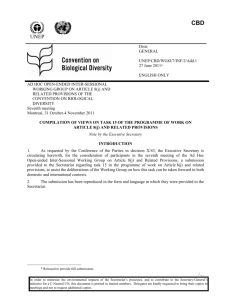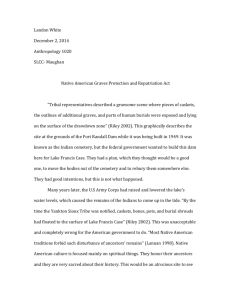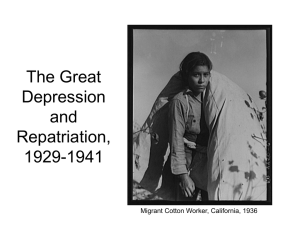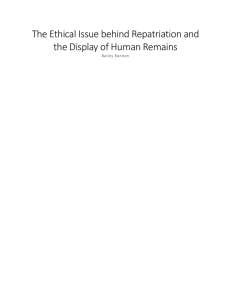and related provisions - Convention on Biological Diversity
advertisement
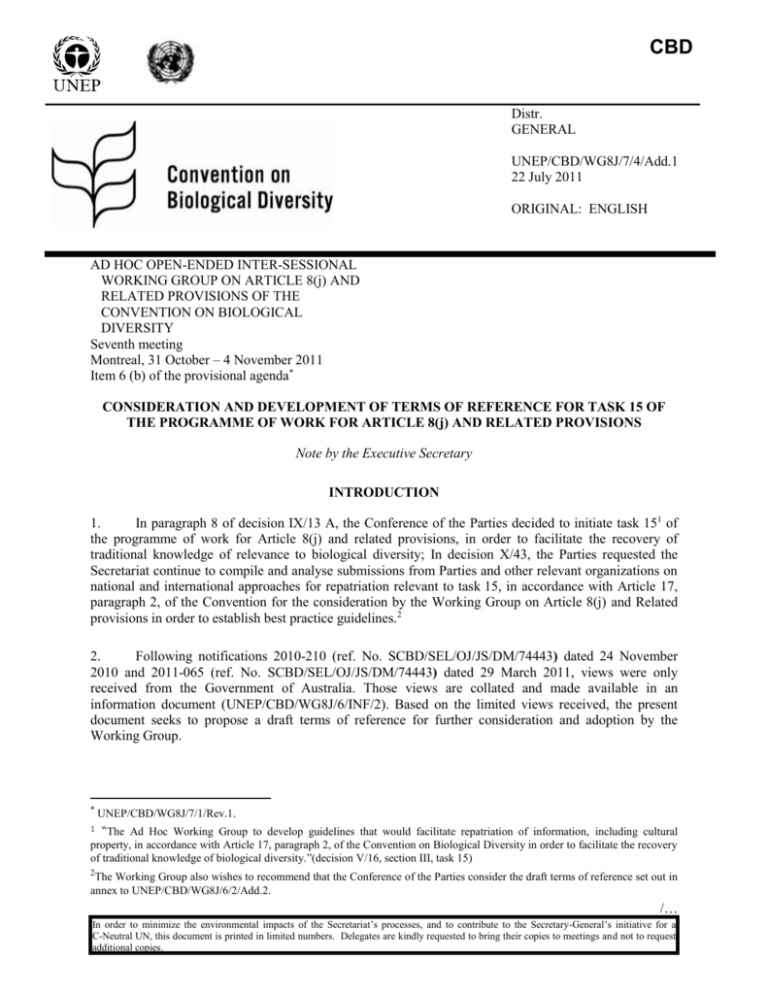
CBD Distr. GENERAL UNEP/CBD/WG8J/7/4/Add.1 22 July 2011 ORIGINAL: ENGLISH AD HOC OPEN-ENDED INTER-SESSIONAL WORKING GROUP ON ARTICLE 8(j) AND RELATED PROVISIONS OF THE CONVENTION ON BIOLOGICAL DIVERSITY Seventh meeting Montreal, 31 October – 4 November 2011 Item 6 (b) of the provisional agenda* CONSIDERATION AND DEVELOPMENT OF TERMS OF REFERENCE FOR TASK 15 OF THE PROGRAMME OF WORK FOR ARTICLE 8(j) AND RELATED PROVISIONS Note by the Executive Secretary INTRODUCTION 1. In paragraph 8 of decision IX/13 A, the Conference of the Parties decided to initiate task 151 of the programme of work for Article 8(j) and related provisions, in order to facilitate the recovery of traditional knowledge of relevance to biological diversity; In decision X/43, the Parties requested the Secretariat continue to compile and analyse submissions from Parties and other relevant organizations on national and international approaches for repatriation relevant to task 15, in accordance with Article 17, paragraph 2, of the Convention for the consideration by the Working Group on Article 8(j) and Related provisions in order to establish best practice guidelines.2 2. Following notifications 2010-210 (ref. No. SCBD/SEL/OJ/JS/DM/74443) dated 24 November 2010 and 2011-065 (ref. No. SCBD/SEL/OJ/JS/DM/74443) dated 29 March 2011, views were only received from the Government of Australia. Those views are collated and made available in an information document (UNEP/CBD/WG8J/6/INF/2). Based on the limited views received, the present document seeks to propose a draft terms of reference for further consideration and adoption by the Working Group. * UNEP/CBD/WG8J/7/1/Rev.1. “The Ad Hoc Working Group to develop guidelines that would facilitate repatriation of information, including cultural property, in accordance with Article 17, paragraph 2, of the Convention on Biological Diversity in order to facilitate the recovery of traditional knowledge of biological diversity.”(decision V/16, section III, task 15) 1 2 The Working Group also wishes to recommend that the Conference of the Parties consider the draft terms of reference set out in annex to UNEP/CBD/WG8J/6/2/Add.2. /… In order to minimize the environmental impacts of the Secretariat’s processes, and to contribute to the Secretary-General’s initiative for a C-Neutral UN, this document is printed in limited numbers. Delegates are kindly requested to bring their copies to meetings and not to request additional copies. UNEP/CBD/WG8J/7/4/Add.1 Page 2 3. To that end, section I below contains proposed draft recommendations, including a draft terms of reference for the consideration of the Working Group, and section II summarizes the views received. 4. Furthermore, to ensure harmonization and coordination with other related international processes, a document of the World Intellectual Property Organization has been made available as an information document. WIPO/GRTKF/IC/17/INF/9, concerning a list and brief technical explanation of various forms in which traditional knowledge may be found, has been made available as a useful contribution concerning the related issue of repatriation and the forms in which traditional knowledge may be found including in cultural property. I. DRAFT RECOMMENDATION FOR THE CONSIDERATION OF THE WORKING GROUP The Working Group on Article 8(j) and Related Provisions may wish to recommend that the Conference of the Parties: Decides to adopt the following terms of reference to advance task 15 in the light of other related and ongoing activities. TERMS OF REFERENCE FOR TASK 15 OF THE PROGRAMME OF WORK ON ARTICLE 8(j) AND RELATED PRIVISIONS 1. The purpose of task 15 is to develop guidelines that would facilitate repatriation of information, including cultural property, in accordance with Article 17, paragraph 2, of the Convention on Biological Diversity, in order to facilitate the recovery of traditional knowledge of biological diversity. 2. Task 15 is to be interpreted in accordance with the provisions of the Convention and, in particular in light of Article 8(j) and related provisions. 3. Task 15 is intended to build on, and enhance, existing repatriation activities undertaken by Parties, Governments and other entities including museums, databases, registers, gene banks, etc. 4. Stakeholders include: (a) Parties and Governments; (b) Museums and other collections containing information on the knowledge, innovations and practices of indigenous and local communities relevant for conservation and sustainable use; (c) Relevant international organizations, and in particular the United Nations Permanent Forum on Indigenous Issues (UNPFII), the United Nations Educational, Scientific and Cultural Organization (UNESCO), and the World Intellectual Property Organization (WIPO); 5. (d) Representatives of indigenous and local communities; (e) Relevant NGOs with expertise on these issues. The Secretariat shall: (a) Compile and analyze submissions by Parties and other relevant organizations on national and/or international approaches for repatriation relevant to task 15, for consideration by the Working Group on Article 8(j) at its eighth meeting, in order to establish best practices learned; /… UNEP/CBD/WG8J/7/4/Add/1 Page 3 (b) Based on best practices, and advice from the Working Group, the Secretariat may develop for the consideration of the Working Group on Article 8(j) and Related Provisions: (i) Best-practice guidelines for the initiation of national repatriation of information, including cultural property, in accordance with Article 17, paragraph 2, of the Convention on Biological Diversity, in order to facilitate the recovery of traditional knowledge of biological diversity; and (ii) Best-practice guidelines or a framework for the initiation of international repatriation of information, including cultural property, in accordance with Article 17, paragraph 2, of the Convention on Biological Diversity, in order to facilitate the recovery of traditional knowledge of biological diversity. 6. Parties, Governments, international organizations, indigenous and local community organizations and non-Governmental organizations are requested to communicate to the Secretariat information on bestpractice models for the repatriation of information and cultural property relevant to task 15. 7. The Working Group on Article 8(j) and Related Provisions, based on information received, will consider at its eighth meeting, best-practice guidelines for the initiation of national repatriation of information, including cultural property and based on this, also consider best-practice guidelines or a framework for the initiation of international repatriation of information, including cultural property. II. VIEWS RECEIVED 8. Australia suggested in its submission that task 15 should be initiated through a request to Parties to submit national approaches for compilation and then consideration, in order to establish best practices learned. Australia also notes that it has a national programme on the return of indigenous cultural property (RICP) and is happy to share information about this programme including the principles and processes. However, Australia also emphasizes that the initiation of task 15 should be fully considered within the in-depth review of the programme of work for Article 8(j) and related provisions. 9. Australia goes on to explain the nature of the domestic programme which represents a collaborative effort between the Australian and State/Northern Territory governments and the Australian museums sector to resolve the issues surrounding collections of ancestral remains and secret sacred objects held in Australian Government museum collections. 10. The programme aims to expedite the repatriation of indigenous human remains and secret sacred objects from their collections to indigenous communities of origin. 11. The return of indigenous cultural property programme is intended to enhance existing repatriation activities undertaken by museums and does not apply to holdings overseas. The programme supports the repatriation of provenanced ancestral remains and secret sacred objects and/or the transfer of ownership where the community may ultimately decide to leave cultural property in the custody of the museum. It also supports provenance research and improved national coordination of repatriation activity. 12. The structure of the national repatriation programme includes two funding sub-categories: (a) The Museum Support Programme provides funds for museums to prepare collections for return to indigenous communities and includes activities such as engagement of consultants; appointment of staff; research of collections; liaison with other museums and communities; field visits; visits by community representatives for identification purposes; transportation costs; freight; and packing materials; /… UNEP/CBD/WG8J/7/4/Add.1 Page 4 (b) The Community Support Programme provides funds for indigenous communities to participate in the repatriation process including: travel and accommodation for community representatives to collect cultural property; community meetings (including travel and accommodation); consultants to assist communities in coordinating returns; reburial expenses; and ceremonies. In the 2007-08 budget, the Australian Government committed $4.716 million over four years as part of its contribution to the Return of Indigenous Cultural Property Programme. Australian Government funding is contingent on matched funding from the states and the Northern Territory. 13. The practical experience of countries such as Australia may be extrapolated for the international context and may also provide practical advice, based on a working programme. -----
